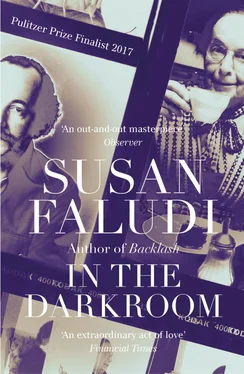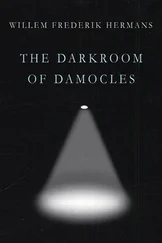1 ...6 7 8 10 11 12 ...22 Occasionally as a small child I would take the commuter train to the city with my father and visit one of the series of Manhattan photo agencies where he worked. He’d lead me to the other side of the partitioned studio, where men perched on high stools before light tables, effacing with fine-tipped brushes the facial imperfections of fashion models. He regarded retouching as the crowning glory of the photographic arts. He would hold up the before-and-after shots of ad copy for me to appreciate. See, she no longer has that unsightly mole! Look, no more wrinkles! He admired the men bent over those light tables, obliterating blemishes. My father rarely involved himself with my educational or professional prospects. But he did, several times, advise me to become a retoucher. Which was peculiar counsel for a daughter who was consumed, from the day she first joined the staff of her grade school newspaper, with exposing flaws, not concealing them. At the heart of our relationship, in the years we didn’t speak and, even more, in the years when we would again, a contest raged between erasure and exposure, between the airbrush and the reporter’s pad, between the master of masking and the apprentice who would unmask him.
4

Home Insecurity
Hegyvidék (literally, “mountain-land”), the XIIth district of Budapest, is high in the Buda Hills. Always an exclusive enclave—home to embassies, villas, the residences of the nouveaux riches—its palatial properties were hot investments in post-Communist, new-millennial Budapest. As the broken-English text from one online real estate pitch I read put it, Hegyvidék is “the place where the luxury villas and modern detached houses—as blueblood estates—are ruling their large gardens in the silent milieu.” To reach my father’s address required negotiating several steep inclines and then a series of hair-raising tight turns on increasingly potholed and narrow roads.
“Damn Communists,” my father said, as the Exclusive plunged in and out of craters in the macadam. “They never fix the streets.”
“Weren’t they fifteen years ago?” I said.
“Waaall, they call themselves the ‘Socialists’ now”—she was speaking of the party in power at the time—“but it’s the same thing. A bunch of thieves.”
The camper wheezed up the final precipice and around a tight curve. A house loomed into view, a three-story concrete chalet. It had a peaked roof and stuccoed walls. A security fence ringed the perimeter, with a locked and alarmed gate. A large warning sign featured a snarling, and thankfully nonexistent, German shepherd.
I wasn’t sure whether the bunkered fortress was an expression of my father’s hypervigilance or that of the culture she’d returned to. Later, I read Colin Swatridge’s A Country Full of Aliens , a reminiscence of the British author’s residence in Budapest in the ’90s, and was struck by his remarks on the Hungarian fetish for home protection:
You may peer at the grandiosity of it all—at the grey-brick drive and the cypress trees, and the flight of steps, and the juttings, and the recesses, and the columns and the quoins—but you may do this only through the ironwork of the front gates, under the watchful eyes of a security camera, and of movement-sensitive security lights. It is fascinating, this need to reconcile security and self-display. The house must show its feminine lacy mouldings, its leggy balusters, its delicate attention to detail, its sinuous sweep of steps; yet it must also show its teeth, and muscular locks, and unyielding ironwork. It must be at once coy and assertive, like a hissing peacock—a thing beautiful and ridiculous …
What is, perhaps, characteristically Hungarian about these green-belt houses, these kitsch castles in the Buda Hills and the Pilis Hills, by Lake Balaton and the Bükk, is the conflation of exhibitionism with high security. It is akin to the confusion of the feminine and the masculine that is a feature of the language.
I knew all about that linguistic confusion. It was a staple of my childhood. “Tell your mother I’m waiting for him,” my father would say. Or “Your brother needs to clean up her room.” Hungarians are notorious for mixing up the sexes in English. Magyar has no gendered pronouns.
My father steered the camper to the far shoulder and yanked on the parking brake. She teetered perilously across the road in her white heels and keyed in the code in a box installed on the defending wall, and the gate creaked open—and shut again as soon as we’d pulled through. The camper labored up the steep driveway and came to a halt in a grassy patch—it was too tall to fit in the house’s two-car garage. A twenty-five-foot flagpole presided over the front lawn. It had three ropes, “so I can show all my flags,” my father told me. “I put up the Hungarian flag on March 15”—National Day, commemorating Hungary’s failed 1848 revolution against the Austrian Empire—“and the U.S. flag on July 4.” The third rope periodically hoisted the banners of my father’s other past residences, Denmark and Brazil.
My father scrambled down from the pilot’s seat and swung her purse over one shoulder. We stood in the drive for what felt to me like a good quarter hour while she fussed with various security measures. First she had to reengage the VW’s internal burglar alarm. Then she had to reset an outdoor surveillance system that “protected” the driveway. Once it was armed, we had sixty seconds to hurry to the front door, the one on the right. The house was a duplex; the other side-by-side identical unit, a doppelgänger residence, stood empty.
Before we entered, my father disarmed a third alarm system—and reactivated it as soon as we got inside. While she punched in numbers, I tried to find my bearings in the gloom. We were standing in a dark hallway. To the right was a stairwell, shrouded in shadow. Wooden steps ascended two levels. At the far end of the hall, through an open door, I caught a glimpse of yellow kitchen cabinets, the same cabinets that had adorned his Manhattan loft. (My father had shipped them, along with the refrigerator, dishwasher, oven, and everything else he owned at the time, including a giant stash of lumber and his VW van, in a forty-foot crate.) She led me down the hall and through another door on the left, which led to a large tiled living room and, off it, a dining room with a chandelier and a display case full of Zsolnay china.
A wall of glass with French doors overlooked the front terrace, but they, too, were dark, the thick drapes closed. “Someone could look in and want to steal my electronic equipment,” she said. She had a lot of it to steal. A wall-mounted cabinet system in the living room was filled, floor to ceiling, with monitors, receivers, amplifiers, speakers, woofers, CD, DVD, VHS, and Betamax players, a turntable, even a reel-to-reel tape machine. The last served to play her old opera recordings, the same ones my father used to blast every weekend in our suburban living room in Yorktown Heights. A half dozen cabinets contained a thousand or more operas on CDs, tapes, videos, and record albums.
Bookshelves lined the opposite wall. On one end were all my father’s old manuals on rock climbing, ice climbing, sailboat building, canoeing, woodworking, shortwave-radio and model-airplane construction. The My-Life-as-a-Man collection, I thought. Not that there was a corresponding woman’s section. Other shelves were populated with works devoted to all things Magyar: Hungarian Ancient History , Hungarian Fine Song , Hungarian Dog Breeds , and thick biographies of various Hungarian luminaries, including a two-volume set of memoirs by Countess Ilona Edelsheim Gyulai, the daughter-in-law of Admiral Miklós Horthy, the Regent who ruled Hungary during all but the final months of World War II.
Читать дальше













